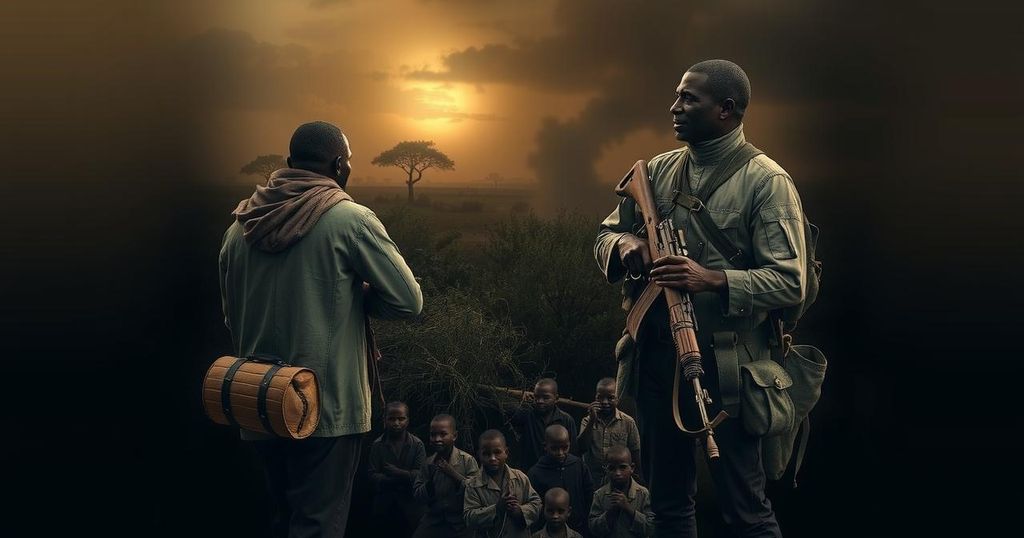Challenges and Hopes for South Sudan: Insights from Cardinal Stephen Ameyu Martin Mulla
Cardinal Stephen Ameyu Martin Mulla has indicated that South Sudan has faced escalated challenges since its independence in 2011, with ongoing conflicts, political instability, and severe humanitarian crises. He criticized government mismanagement and the failure to implement peace agreements, contributing to continual economic decline and suffering for the population. Amid these issues, there is cautious optimism regarding the potential of the Synod on Synodality to facilitate dialogue and promote peace-building efforts.
In the fourteen years since South Sudan gained its independence from Sudan, Cardinal Stephen Ameyu Martin Mulla has expressed concern that the nation has encountered increasing challenges rather than resolution of its issues. The Cardinal, who is a leading figure in the Catholic Church in South Sudan, articulated this sentiment during the Synod on Synodality in Rome, emphasizing that despite the initial hope surrounding independence, the reality has been a persistent struggle for peace and effective governance. The Cardinal highlighted governmental mismanagement of the country’s rich natural resources as a critical factor contributing to ongoing instability and unrest. “We got this independence from Sudan. We thought that we were going to solve our problems. But it seems that problems have increased,” Cardinal Ameyu stated. He noted that the initial aspirations for freedom have led to a return to conflict, particularly since the outbreak of civil war in 2013, following the political betrayal between President Salva Kiir and former Vice-President Riek Machar. Despite several peace agreements, including those in 2015, 2017, and 2018, persistent violence continues, exacerbated by rival factions and militias that have further inflamed intercommunal clashes. Father John Gbemboyo, from the Sudan Catholic Bishops’ Conference, reiterated that these conflicts have worsened the human rights and humanitarian situations within South Sudan. A peace agreement signed in 2018 stipulated various reforms, including government restructuring, the drafting of a constitution, and the conduction of elections in December 2024. However, the lack of political will has resulted in delays, moving the election to December 2026, as noted by Gbemboyo. Cardinal Ameyu lamented this stagnation, stating, “In South Sudan, we still have outlying issues of the revitalized peace agreement, which, in a way, the leadership in South Sudan is unable to implement to the letter.” Moreover, the economic crisis has worsened with rampant inflation and unpaid civil servants, compounded by environmental challenges such as flooding, which has devastated agricultural production and displaced communities. The economy’s fragility has also been affected by returning refugees from Sudan, who lack essential resources for survival. Addressing the broader regional instability, Cardinal Ameyu commented on the ongoing conflict in Sudan, which erupted in April 2023 between military factions vying for control. The cardinal reported the devastating toll this conflict has taken, with thousands dead and millions displaced, creating a humanitarian crisis that extends into South Sudan. He noted, “In Sudan, two generals just decided to bring war on people…there’s no safety anywhere in Khartoum.” Despite these dire conditions, Cardinal Ameyu expressed optimism that the Synod on Synodality could foster dialogue and serve the greater purpose of peacebuilding. He emphasized the necessity of viewing leadership as a service to the people rather than an exertion of power. He stated, “This is clear in the synod. Without dialogue, we cannot settle things in the church or in the political arena.” Gbemboyo added that as the Synod unfolds, there is an opportunity for the global Church to foster efforts toward peace in South Sudan, reinforcing the significance of unity and understanding among its communities in the pursuit of a brighter future.
South Sudan, which attained its independence from Sudan on July 9, 2011, after decades of civil conflict, has struggled to consolidate peace and stability since its formation. The optimism surrounding independence has been increasingly overshadowed by political conflict and social unrest. The onset of a civil war in 2013 exposed deep fissures within the political landscape, while repeated peace attempts have met with limited success. The country remains fraught with challenges related to governance, economic hardship, and ongoing humanitarian crises., particularly exacerbated by regional conflicts and natural disasters affecting vital infrastructure and livelihoods.
In conclusion, Cardinal Stephen Ameyu Martin Mulla’s remarks highlight the ongoing struggles faced by South Sudan in the aftermath of its independence. The nation grapples with unimplemented peace agreements, rampant corruption, and a deteriorating economic situation amidst ongoing conflicts. Yet, there remains hope in the potential of synodal dialogue to offer a path toward reconciliation and peace. The cardinal’s call for transformative leadership that prioritizes service over power signifies a crucial step toward resolving the crises afflicting not only South Sudan but also its neighbor, Sudan.
Original Source: cruxnow.com




Post Comment